
Ducati Diavel Service Manual: Topping up the electrolyte
Warning
Before carrying out any operations on the battery, keep in mind the safety standards (sect.1 - 3, General safety rules).
The electrolyte in the battery is toxic and can cause burns if it comes into contact with the skin because it contains sulphuric acid. Wear protective clothing, a face-mask and goggles when adding electrolyte. If the liquid comes into contact with the skin, wash thoroughly with cold water. If it comes into contact with the eyes, wash thoroughly with water for 15 minutes and consult an ophthalmologist. In the event of accidental ingestion, drink large quantities of water or milk, and continue with milk of magnesia, beaten egg or vegetable oil. Do not allow sparks, flames, cigarettes or any other heat source to come near the battery, as it produces explosive gases. When recharging or using the battery indoors, make sure that the room is adequately ventilated. Do not inhale the gases produced during recharging. Keep out of reach of children.
Place the battery on a flat surface. Remove the protective film (1).
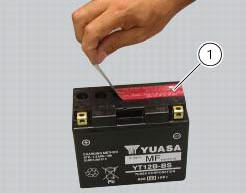
Warning
Make certain that the electrolyte is of the specific type for your battery.
Remove the container with the electrolyte from the plastic bag. Remove the cap strip (3) from the container (2).
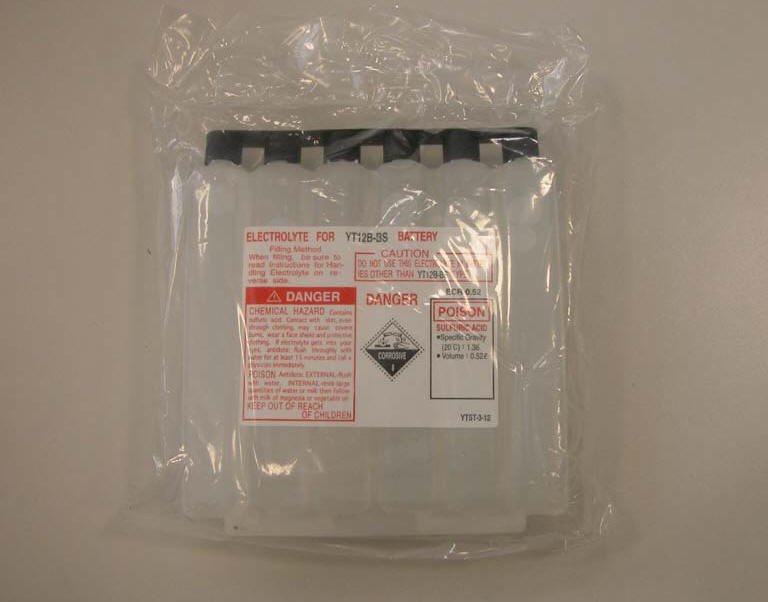
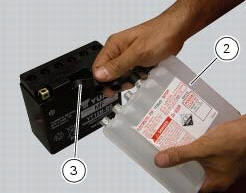
Important
Keep the cap strip (3) to hand because it will be used later as plugs for the battery cells.
Warning
Do not peel or perforate the sealed areas.
Place the electrolyte container (2) upside down. Align the six sealed elements with the six filler holes on the battery.
Push the container (2) downwards with sufficient force to break the seals and allow the liquid to flow out.
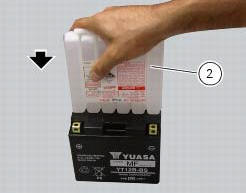
Note
Do not tilt the electrolyte container as this could interrupt the flow temporarily or even permanently.
Make certain that air bubbles emerge from all six filler holes. Leave the container in this position for at least twenty minutes.
If no bubbles emerge from one of the holes, tap gently on the bottom of the respective container.
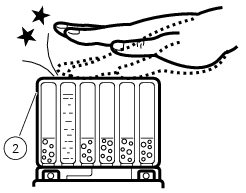
Important
Never move the container away from the battery. Do not cut or puncture the liquid container.
Make sure that all the electrolyte has flowed out. Carefully extract the container (2) from the battery.
Fit the cap bar (3) -previously removed from the electrolyte container (2)- to the battery, ensure the caps plug off all filler holes.
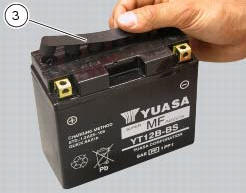
3 -12 Ah batteries: leave to stand for at least 30 min.
12 Ah batteries: leave to stand for at least 1 hour.
Rest the cap strip on the filler holes without fixing it. Recharge the battery as described in the paragraph "recharging the battery".
Note
When using an automatic reduction battery charger, check that the charger current (ampere) is equal or higher than the value of standard charging system (std) indicated on the battery itself.
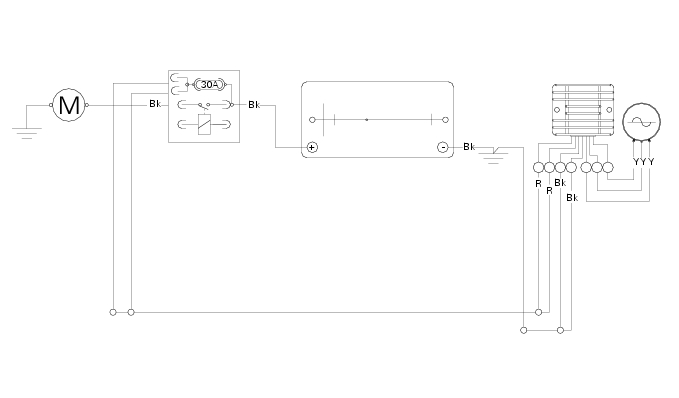
Press firmly downwards with both hands until the caps are firmly in place (do not use a hammer).
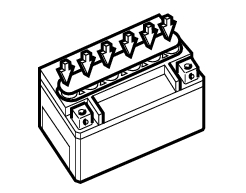
 Recharging the battery
Recharging the battery
Examine the label on the battery showing the check intervals in order to
determine when to test the voltage.
Charge the battery if the open circuit voltage is lower than 12.8 V. Leaving
the b ...
 Battery
Battery
Battery safety rules
Warning
Before carrying out any operations on the battery, keep in mind the
safety standards (sect. 1 - 3, General safety rules).
When under charge, batteries produce explo ...
Other materials:
Menu 2 on/off function
This function turns off and back on the menu 2.
If menu 2 is disabled, the functions for average fuel
consumption (cons.Avg), instantaneous fuel consumption
(cons.), Average speed (speed avg), trip time (trip time)
and air temperature (air) will no longer be displayed in the
"main screen ...
Overhauling the rear wheel
Inspect the condition of the rear wheel.
As the wheel rim has no bearings, it should be supported using the service tool
code 88713.2951.
Note
This service tool can also be used to install the wheel on a balancing
machine.
Overhauling the wheel
Inspect the wheel as described below.
...
Explanation of the function of the ride-by-wire system
Mechanism
Via metal cables, the throttle grip operates a roller mounted on one end of a
spindle located near the horizontal cylinder
throttle valve spindle.
The aps sensor, which measures the position of the throttle grip itself, is
mounted on the opposite end of this spindle.
A mechanic ...